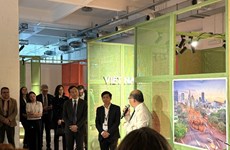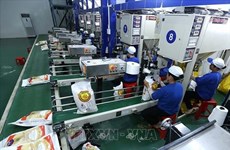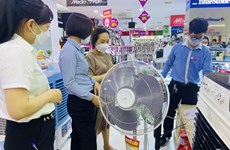Beverage market continues to attract investors
Vietnam’s beverage market remains rich in promise, reflected by the
increase in the number of recent investments from major domestic and
foreign enterprises, says Vietnam Investment Review (VIR).
Vietnam’s beverage market remains rich in promise, reflected by the
increase in the number of recent investments from major domestic and
foreign enterprises, says Vietnam Investment Review (VIR).
Tan Hiep Phat, one of Vietnam’s leading beverage groups, will start operations of its 85 million USD beverage manufacturing plant in the northern province of Ha Nam’s Kien Khe Industrial Park in the second quarter of next year, Mai Tien Dung, Chairman of the Ha Nam Provincial People’s Committee confirmed with VIR last week.
In August last year, Tan Hiep Phat received an investment certificate to establish Ha Nam Number 1 Limited Company for the development of the new 600 million litre non-carbonated drinks plant on a 25 hectare site.
The latest figures from the London-based market research and business-intelligence report firm Euromonitor International showed that in 2010 Tan Hiep Phat held a 53 percent market share in the bottled water and herbal tea drink market.
Vietnam’s beverage market has continued to attract fierce competition. According to Vietnam Competition Administration, Vietnam was home to 134 local and foreign beverage manufacturers last year, with the top ten in terms of revenue including IBC, Tan Hiep Phat, Coca-Cola, PepsiCo, Interfood, Red Bull, La Vie, Chuong Duong Beverages, CKL, and Vinh Hao.
According to Euromonitor’s report on Vietnam’s soft drinks market dated August 2013, multinational players PepsiCo Vietnam, Coca-Cola Beverages Vietnam and URC Vietnam, and domestic firms of Tan Hiep Phat and Vietnam Dairy Products JSC occupied the top five.
“These top five players occupied a major proportion of market share, leaving little space for other players and making it difficult for new companies to penetrate the market,” read the report.
Coca Cola and PepsiCo still hold the largest share of the Vietnamese beverage market, occupying about 60 percent between them.
Coca Cola also plans to invest an additional 300 million USD into the Vietnamese soft drink market by 2015. The company entered Vietnam in 2009 with an initial investment of 200 million USD.
In addition, PepsiCo Vietnam earlier this year formed a joint venture with Japan’s Suntory Holding Ltd in which Suntory would buy a 51 percent stake in PepsiCo’s Vietnamese beverage business. The deal is an important part of PepsiCo’s long-term strategy in Vietnam. So far, Pepsi has poured 118 million USD into two beverage plants in Dong Nai and Bac Ninh provinces.
The Philippines’ leading food and beverage manufacturer Universal Robina Corp (URC) has also targeted expansion plans, with the intention to build its third 35 million USD beverage manufacturing facility in the central province of Quang Ngai late this year. In Vietnam, URC is known for its popular C2 and Rong Do brands.
Since it is near to impossible to compete with foreign giants such as Coca Cola and PepsiCo in the carbonated drink market, domestic beverage companies have chosen to focus on non-carbonated alternatives.
Tan Hiep Phat also is investing in another beverage manufacturing plant worth $86 million in Quang Nam province’s North Chu Lai Industrial Park. The firm plans to build on its strong point of tea products with its extremely successful Dr. Thanh and Number 1 brands.
Euromonitor said that there were more than 10 tea brands in the market, with C2 and Dr. Thanh maintaining a leading position.
Masan Consumer recently acquired a 62 percent of Vinh Hao Mineral Water Company group, marking its venture into the drink business field. Last month Vinh Hao announced a board resolution to expand into other business fields which implies Masan will broaden Vinh Hao’s product portfolios to other categories, including ready to drink tea, soft drinks, juices and energy drinks.
“Soft drinks will continue to see strong performance, although growth will not be as strong as during the reviewed period. Fruit juice and tea will be the main drivers of growth, due to rising health concerns,” stated Euromonitor’s report.
According to Euromonitor, Vietnam’s 2.5 billion USD bottled water and bottled beverage market is expected to grow at 20 percent per year during 2011-2015.-VNA
Tan Hiep Phat, one of Vietnam’s leading beverage groups, will start operations of its 85 million USD beverage manufacturing plant in the northern province of Ha Nam’s Kien Khe Industrial Park in the second quarter of next year, Mai Tien Dung, Chairman of the Ha Nam Provincial People’s Committee confirmed with VIR last week.
In August last year, Tan Hiep Phat received an investment certificate to establish Ha Nam Number 1 Limited Company for the development of the new 600 million litre non-carbonated drinks plant on a 25 hectare site.
The latest figures from the London-based market research and business-intelligence report firm Euromonitor International showed that in 2010 Tan Hiep Phat held a 53 percent market share in the bottled water and herbal tea drink market.
Vietnam’s beverage market has continued to attract fierce competition. According to Vietnam Competition Administration, Vietnam was home to 134 local and foreign beverage manufacturers last year, with the top ten in terms of revenue including IBC, Tan Hiep Phat, Coca-Cola, PepsiCo, Interfood, Red Bull, La Vie, Chuong Duong Beverages, CKL, and Vinh Hao.
According to Euromonitor’s report on Vietnam’s soft drinks market dated August 2013, multinational players PepsiCo Vietnam, Coca-Cola Beverages Vietnam and URC Vietnam, and domestic firms of Tan Hiep Phat and Vietnam Dairy Products JSC occupied the top five.
“These top five players occupied a major proportion of market share, leaving little space for other players and making it difficult for new companies to penetrate the market,” read the report.
Coca Cola and PepsiCo still hold the largest share of the Vietnamese beverage market, occupying about 60 percent between them.
Coca Cola also plans to invest an additional 300 million USD into the Vietnamese soft drink market by 2015. The company entered Vietnam in 2009 with an initial investment of 200 million USD.
In addition, PepsiCo Vietnam earlier this year formed a joint venture with Japan’s Suntory Holding Ltd in which Suntory would buy a 51 percent stake in PepsiCo’s Vietnamese beverage business. The deal is an important part of PepsiCo’s long-term strategy in Vietnam. So far, Pepsi has poured 118 million USD into two beverage plants in Dong Nai and Bac Ninh provinces.
The Philippines’ leading food and beverage manufacturer Universal Robina Corp (URC) has also targeted expansion plans, with the intention to build its third 35 million USD beverage manufacturing facility in the central province of Quang Ngai late this year. In Vietnam, URC is known for its popular C2 and Rong Do brands.
Since it is near to impossible to compete with foreign giants such as Coca Cola and PepsiCo in the carbonated drink market, domestic beverage companies have chosen to focus on non-carbonated alternatives.
Tan Hiep Phat also is investing in another beverage manufacturing plant worth $86 million in Quang Nam province’s North Chu Lai Industrial Park. The firm plans to build on its strong point of tea products with its extremely successful Dr. Thanh and Number 1 brands.
Euromonitor said that there were more than 10 tea brands in the market, with C2 and Dr. Thanh maintaining a leading position.
Masan Consumer recently acquired a 62 percent of Vinh Hao Mineral Water Company group, marking its venture into the drink business field. Last month Vinh Hao announced a board resolution to expand into other business fields which implies Masan will broaden Vinh Hao’s product portfolios to other categories, including ready to drink tea, soft drinks, juices and energy drinks.
“Soft drinks will continue to see strong performance, although growth will not be as strong as during the reviewed period. Fruit juice and tea will be the main drivers of growth, due to rising health concerns,” stated Euromonitor’s report.
According to Euromonitor, Vietnam’s 2.5 billion USD bottled water and bottled beverage market is expected to grow at 20 percent per year during 2011-2015.-VNA












